| |
"There is always something a little unreal about being paid for doing something that you love to do. We ate well, we drank well, and we slept well, and we loved each other. We knew what we were doing, and we saw that it was good. We had made new friends and no enemies. It was one of the most delightful experiences of my life in movies." |
| |
From Michael Powell's second volume of
his autobiography, Million Dollar Movie |
Imagine my initial but short lived delight. I prided myself that I knew a fair amount about the life and career of Michael Powell having read his two bounteous bricks of autobiography and seen most of his outstanding output, his collaboration with Emeric Pressburger being the highlight of both men's cinematic careers. The idea of reviewing a long unavailable Michael Powell film was intoxicating enough but when I thought for a split second that it was a comedy from 1968 under the Disney banner, I really resisted the obvious fact that I must have been mistaken. But it did set me dreaming of an oh-so safe children's comedy as directed by Michael Powell, Blackbeard's Ghost, starring Peter Ustinov. Powell went on to direct a Children's Film Foundation film (The Boy Who Turned Yellow) so it wasn't so far-fetched. And Powell had worked with Ustinov on One of Our Aircraft is Missing in 1942… But then sanity, as is its wont, prevailed and I realised that if kettles of fish were as different as the saying goes, then Bluebeard's Castle (original German title Herzog Blaubarts Burg) is a fine example… It doesn't get more different than this.
The original 17th century tale is as gruesome as others of its ilk. In the West, we've mostly been delivered sanitised versions of the most famous fairy tales. Go back to the originals and you'll find a few details that dear old Walt and his animators were wise to stay away from. For example, in the original Cinderella, her stepsisters are so determined to marry the prince, one cuts off her toes and the other lops off a heel to try and squeeze their respective feet into the slipper. Lovely. And Cinderella takes revenge on her abhorrent stepsisters after their appalling treatment towards her by having birds peck out their eyes. Charming. Well, true to fairy form, Bluebeard murdered his wives one after the other and kept their six bodies hanging on meat hooks in a locked vault in his castle. The seventh soon-to-be-wife, overcome with curiosity and against Bluebeard's wishes, finds the horrific tableau. Just as Bluebeard is about to murder her too, her brothers show up and kill him. Now, I didn't know any of this before I watched Bluebeard's Castle and I watched it as director Michael Powell had intended in 1963; with no subtitles and as it was sung in German, you had to concentrate on the visuals to glean a modicum of sense. OK. Well. Right… I could understand almost nothing despite the vibrant and gaudy production design so I would seriously advise putting the subtitles on. Powell relented in part and for the film's re-emergence in the late 70s, he had infrequent strategic subtitles burnt in giving the audience the tiniest morsels to help interpret what was going on. I reproduce those at the end of this review. I suggest you watch the film with all the help you're given. I was so grateful for the subtitles, I can't tell you.
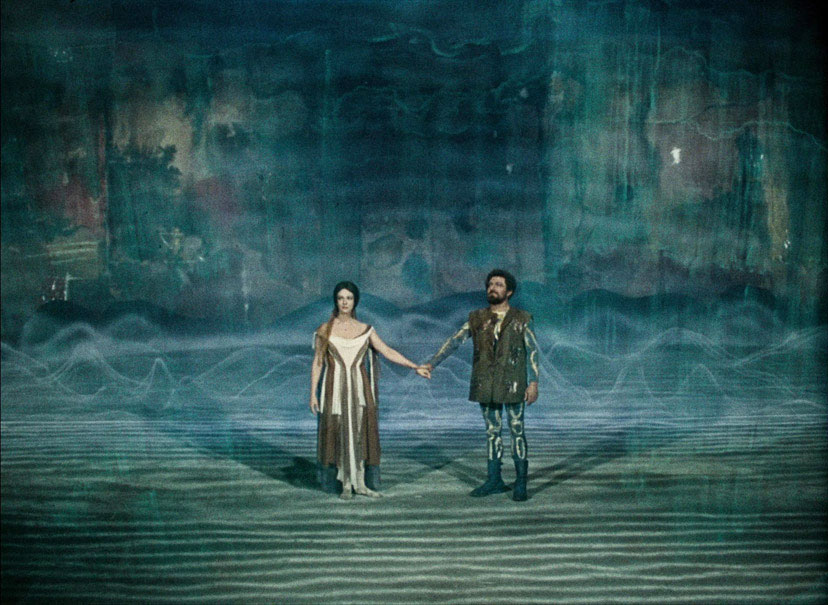
OK, an admission. I have seen only about twenty operas live. I still find the form somewhat perplexing, even comical in some aspects. The prospective fourth wife, Judith, before she enters the 'castle', sings exquisitely but when I turned on the subtitles for my second viewing, I couldn't help but snort at the line "My dress got in a muddle." Mundanity performed in the style of opera makes it even funnier. Hearing that sort of matter-of-factness performed in a foreign language has its advantages. Not understanding is a get-out-of-jail card. Opera to me is like quantum physics. Nothing happens the way you think something is going to happen. So, as you may have guessed, I am not the most sympathetic audience for this kind of work. I really envy those who seem to get so much out of opera. It's a closed world to me, one which features, granted, some of the most sublime music ever written. I'm certainly not immune to the greatness of Wagner and Verdi et al. It's just that I'd rather listen to the sublime music than sit though the counterfeit sing-your-way-through-the-plot histrionics. I guess you could say that opera puts the art into artificial. I was just never a taker. So that might derail everything I have to say about this curio from one of the best film directors who ever lived.
Visually, the film sparkles in a good way (not in the negative dust damage way). We are drawn in to a castle, a surrealist representation of the mind of a murderer. Bluebeard has invited a woman, his next wife, Judith, into his life and goes about taking her deeper and deeper into his depravity. The different spaces represent aspects of his personality and as Judith attempts to bring light to darkness, she is slowly corrupted by the black essence at Bluebeard's core. Thematically, the film shares some outlying subtext with Darren Aronofsky's extraordinary mother!. But with more singing. There is no plot as such. There are moments of respite but (forgive the pun) this is a damnably grim fairy tale. You can feel the director's stamp on the homemade unreality of the props and settings. Powell has never been a director too worried about realism. I imagine him having conversations with his matte painters, asking them to dial down their creations' 'reality'. The film starts with a charcoal rendering of a dark castle built on a narrow but high mountain. We zoom into its lower floors to introduce the two main and only characters.
The first thing that struck me was that the singing appeared to be effortless. Let me unpack that. When an opera singer is belting out an aria, it takes some physical work. When Bluebeard and Judith are singing, on screen it's just their mouths performing. I'm sure this was intended by Powell. Leave the effort to the pre-recorded singing they mime to so the performances can be more subtle without the effort singing actually takes. The power of their voices is immense and you expect some sort of visible effort to get that sound. But then we are in an allegorical world so perhaps I shouldn't worry about things like this. Hein Heckroth's set design, and I mean this as a compliment, echoes nursery art classes where the children make objects out of silver paper, glue and limitless imagination. When you see more formidable designs, seemingly carved out of stone, we are wading into the workshops of H. R. Giger and Dick Smith's cast offs from Altered States. Speaking of which, at about 16 minutes in, there's a piece from the opera that sounds identical to a cue from John Corigliano's masterful score to the Ken Russell classic.
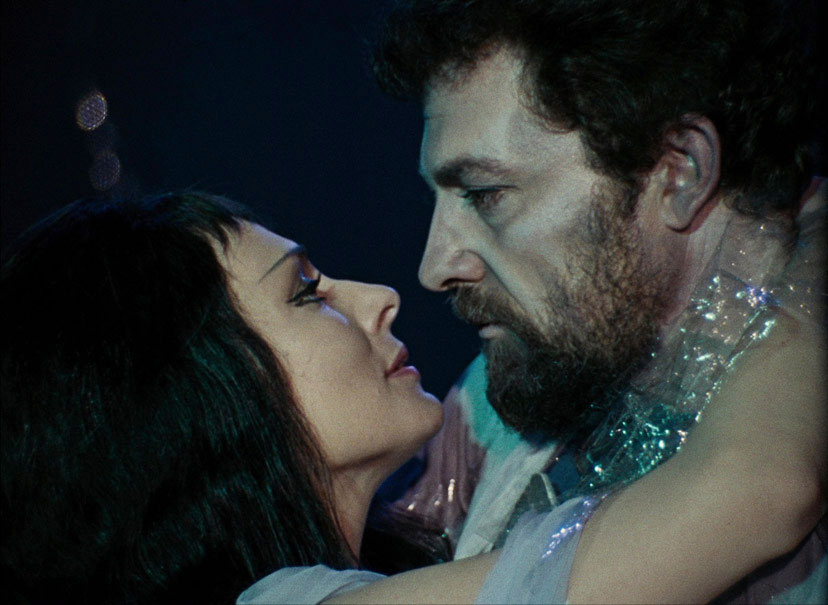
The fact that Powell was so taken by simply listening to the Bartók opera is also something I am at pains to fully understand. When I knew this film was on its way, I opened myself up to the opera and did not have the same all-embracing experience that Powell had when he first heard it. Clearly. The score is hugely dramatic but you'd have to be a god to sing in a language I do not understand to move me. The two performers, Norman Foster as Bluebeard (what a powerful voice) and Ana Raquel Satre as Judith (ditto) bite down hard on to two roles that could not be more detached from any narrative mooring. They both do a terrific job with the small exception of intimacy. Ms Satre's mouth is resolutely closed when kissing Foster and Foster seems a little awkward embracing his new love. These are nit-picks. The simple fact is that if you enjoy opera, you are very likely to enjoy this surrealist fantasy (on a budget). If you are a Powell completist, you have to see this film but I suspect, with the greatest respect, that it won't venture out of its case as often as his other work.
While watching Bluebeard's Castle I had the distinct impression of another gaudy fairy tale, the childhood nightmare of The Singing Ringing Tree, a Bavarian 'Tales From Europe' shown on the BBC in my infancy. That one scared and scarred me. Bluebeard has that same 'otherness' to it, a work, the like of which I have never seen before. I'm on my third viewing and I have to say that a spell is most definitely cast. You just have to redefine the phrase 'suspension of disbelief' and go with the (bloody) flow…
The quality of the 1.37:1 aspect ratio 35mm image is absolutely edible. It's Powell so expect colour. It's not technically Technicolor but straight 35mm is still one of the greatest recording mediums ever invented. There's not a spot of dirt anywhere to be found and the colours pop out at you despite the darkness inherent in almost every frame. Foster is wearing dark make up and lights and colours shift to convey mood across his features. I am amazed at how vibrant everything looks. This restoration is a prime example on how to treat our celluloid treasures.
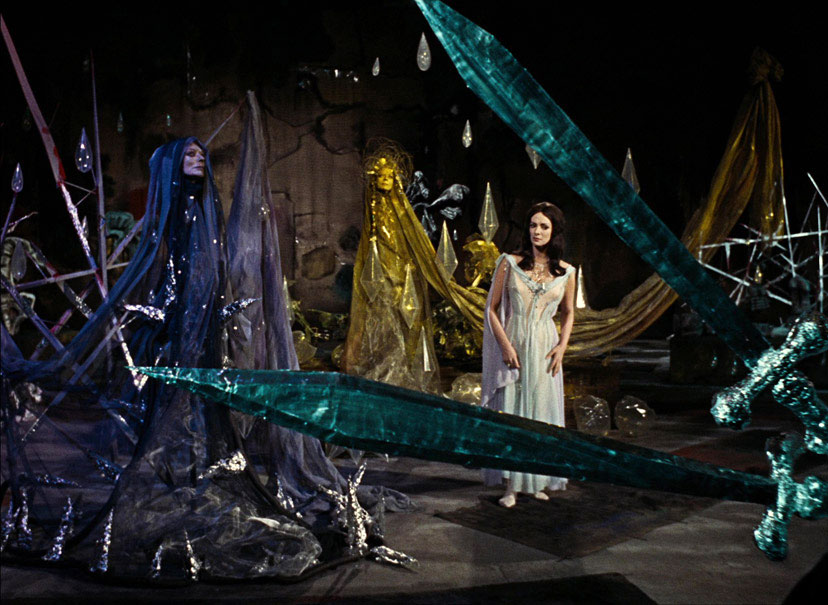
The (one assumes) original mono soundtrack has been upgraded to stereo and there is no faulting this restoration either. The two voices are clear and distinct and because of the nature of opera, there were a few words I couldn't catch in the English version but keep those subtitles on! On the back of the Blu-ray cover, it mentions an LPCM mono soundtrack but my software tells me it's a stereo track. Let's live with that contradiction.
There are optional English subtitles which for non-German speaking viewers should be mandatory!
There is also available an optional audio track of the English translation commissioned by Michael Powell and sung by Norman Foster and Ana Raquel Satre. It's well worth checking out but I still needed the subtitles to guide me through the narrative.
Newly recorded interview with film scholar Ian Christie, 2023 (21:07)
The Archers' champion of note, Ian Christie, gives us a very valuable info packed interview where he places Bluebeard in its early sixties' context. This is one of very few discs where I would advise getting as much information as possible before watching the main film. It will enhance the experience significantly.
Picture Business: Michael Powell at Dartmouth, 1980: A short documentary depicting Powell's time as Artist in Residence at Dartmouth College in 1980 (15:46)
This is very touching for me personally because it was the year I managed to spend half a day with the great man myself. For a little more on that, have a look at the second paragraph here. Powell is supervising students at Dartmouth shooting a scene from a favoured book series of his, The Tales from Earthsea by Ursula K. Le Guin. David Thomson gives us a great introduction to the man and his work. Thomson (if it is the same man – just checked, it is) is still one of the best film writers out there. A great introduction to his passion and writing skills is "Have You Seen...?": A Personal Introduction to 1,000 Films. Highly recommended. My favourite part of this short film is when the student editor disagrees with Powell at the Steenbeck editing table. Brave boy. You get a fleeting glimpse into the steel that must exist in all great artists.
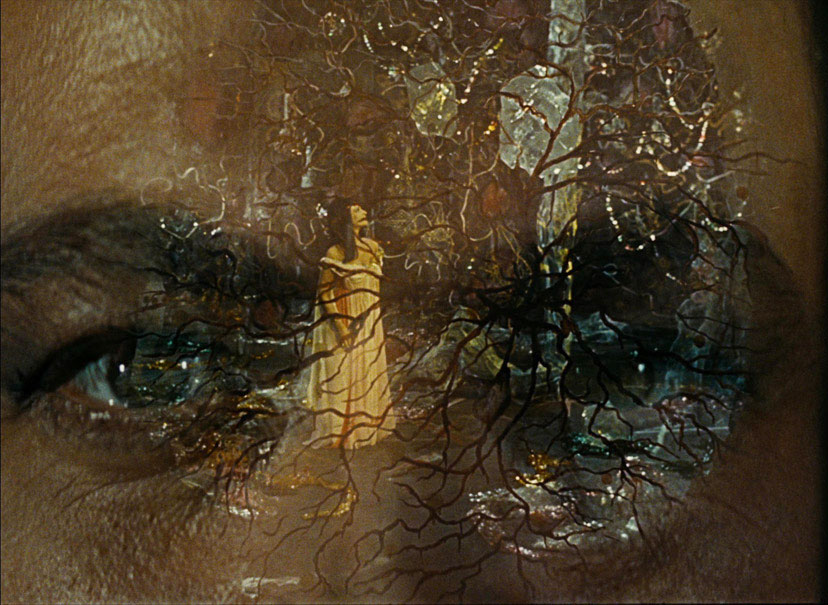
An image gallery of production designs by Hein Heckroth (2:23)
22 colour images of certain scenes in the piece. I'm not sure Powell was considering having Judith naked throughout the film but Heckroth didn't seem to find the need to dress her. But then these are ideas, thoughts, dreams, nightmares. As it was Heckroth who got Powell on board at the very start, it seems very appropriate to have this extra feature.
Fully illustrated booklet featuring writing by Michael Powell, Bertrand Tavernier, Ian Christie and Lillian Crawford.
Note, this booklet is only included with the first pressing of 2,000 copies. You want the full package, then snap it up smartish.
An Artwork of the Future by Ian Christie
As reliable as ever, Christie here is able to enlarge on the research around the film, touched briefly upon in his own special feature, going into some detail about how Powell may have given birth to a new artform, a bridge from staged expressionism to a world-wide audience via new technology. Or as it was known at the time of its birth, 'television'.
Bluebeard's Castle: A Prologue by Michael Powell
Powell sums up the genesis of the project and the joy he had working on it from his second autobiography, Million Dollar Movie. It's delightful to learn all about cameraman Hannes Staudinger and how Powell became good friends with him. He even took him to Australia to shoot Age of Consent.
Bertrand Tavernier on Bluebeard's Castle
The great French filmmaker wrote this short essay as a taster for a screening of Bluebeard's Castle in February 2008. He starts from the position of regarding the Bartók opera as 'one of the masterpieces of the last century.' Well, if that's his starting position, I could well understand his enthusiasm for the Powell interpretation. As I said earlier, I have yet to grasp the full appeal of operatic performance.
Special Features by Alex Prideaux
More information on each of the special features, well worth a read especially Powell's connection to Ursula K. Le Guin and can you imagine Clint Eastwood in the starring role of A Wizard of Earthsea? I'm still reeling at Ana Raquel Satre's efforts making the film. She was not a confident English speaker, Spanish being her native language and she managed to perform her part in German and English… Respect.
Hein Heckroth by Lilian Crawford
A well-researched piece detailing how Heckroth came to work with the Archers and Powell in particular. Brimming with detail, you get a real sense of one of Powell's major collaborators whose art was interrupted by the threat posed by Hitler. Heckroth's wife was Jewish and with no small pride in our now broken nation, it pleases me no end that the UK took them in.
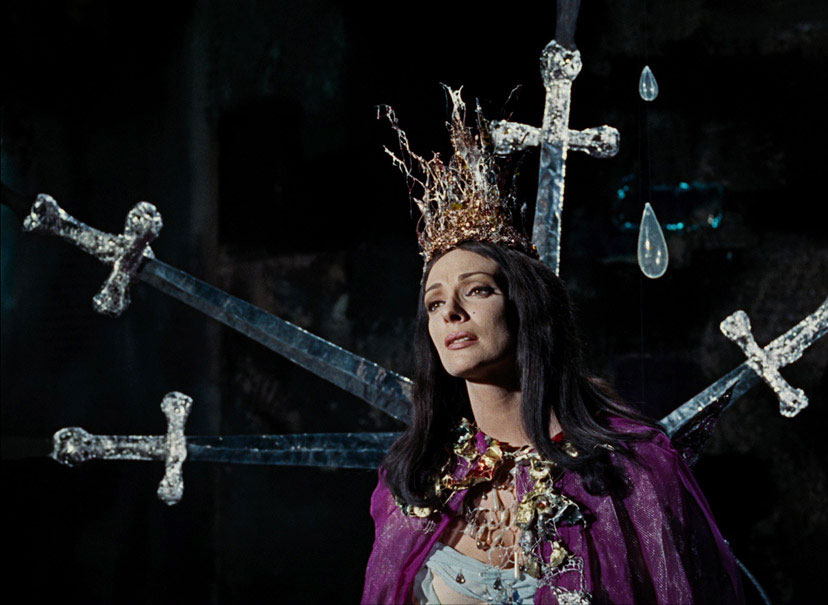
Norman Foster by Lilian Crawford
Nice to focus on the person who kickstarted the whole project, producer Norman Foster who also happened to be the star of the piece though Powell may say otherwise. He felt that Ana Raquel Satre, unknowingly nudged the eponymous anti-hero out of the spotlight and that Foster may have harboured some resentment that her light and fire was stoked by Powell in his one on one direction. This article gives a good overview of the great singer's career.
Ana Raquel Satre by Lilian Crawford
Crawford enlarges on Powell's interest in his leading lady and how the focus shifted from the tortured murderer to the entrancing woman forcing Bluebeard to offer up his darkest secrets. It didn't hurt that Satre was statuesque and had an extraordinary voice. Powell describes her as "clumsy looking in an endearing sort of way," as she doesn't conform to any cinematic stereotype of female beauty – and let's have many more examples of that. But she is very attractive to watch and to listen to.
Notes on the Restoration by Kieron Webb
As ever we have Powell stalwarts, director Martin Scorsese and his editor, (Powell's widow) Thelma Schoonmaker Powell, to thank for overseeing this restoration. I adore the effort these two giants of cinema put into keeping Powell's work and spirit alive.
Acknowledgments
As it says…
If you like and appreciate the operatic template, then there is a great deal of creativity to admire in Powell's version of this dark tale. With imaginative flights of fancy soaring, Powell is well served by his go-to production designer Hein Heckroth. While I cannot, hand on heart, recognise the opera for the masterpiece Bernard Tavernier seems to think it is, Powell has certainly added his distinctive vision to the material and made the tale his own.
Michael Powell's Added Subtitles
(These certainly would have helped me enormously on my first watch…)
"Bluebeard brings Judith as a bride to his dark and gloomy castle."
"Judith vows that love, music and sunshine shall transform Bluebeard's castle."
"In Bluebeard's castle, there are seven doors."
"Judith pleads with Bluebeard to have no secrets from her."
"Judith asks for the keys to the seven doors."
"Behind the first door is Bluebeard's torture chamber."
"Judith smells blood on the castle walls."
"The key to the second door."
"Bluebeard's armoury."
"Bluebeard warns her that to know him too well is to lose him."
"Behind the third door is Bluebeard's treasure chamber."
"There is blood on the crown."
"Behind the fourth door is Bluebeard's garden."
"There is blood on the flowers."
"Beyond the fifth door lie Bluebeard's vast lands and mountains."
"There is blood on the clouds"
"Only two more doors."
"The last door must stay shut."
"Open the seventh door."
"Bluebeard grants Judith's wish."
"Behind the seventh door are Bluebeard's former wives."
"The seventh and last door."
"He remembers young love in the morning."
"The splendour and passion of mid-day."
"The calm and cool of evening."
"Now Judith too has become one of his memories."
|